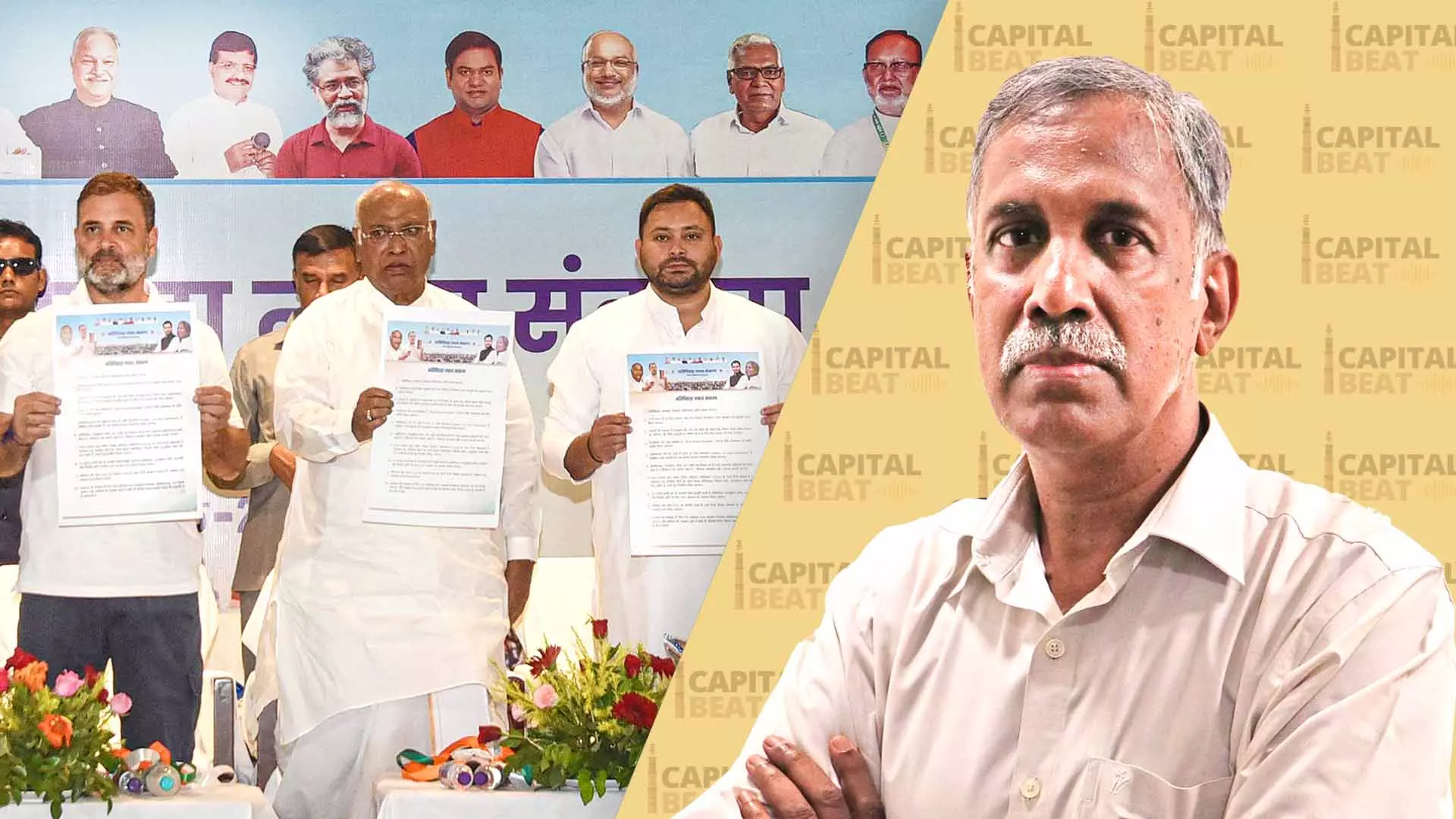
Why EBC Nyay could be central to Grand Alliance’s Bihar strategy | Capital Beat
Congress and RJD launch an EBC-focused manifesto ahead of Bihar polls; the 10-point plan promises jobs, reservations, and social justice guarantees

In this episode of Capital Beat, senior journalists Ashok Mishra and Faizan Ahmad, along with Puneet Nicholas Yadav of The Federal, discussed the Congress and RJD’s new strategy for the Bihar assembly elections.
The focus was on the Extremely Backward Classes (EBCs), which constitute 36 per cent of the state’s electorate. The Grand Alliance, led by Rahul Gandhi and Tejaswi Yadav, released a 10-point manifesto targeting EBCs at a public meeting in Patna, aiming to regain their support ahead of the 2025 elections.
The manifesto, titled Ati Pichda Naya Sankalp Patra, promises economic and social upliftment for EBCs. Rahul Gandhi stated, “This is not a promise for EBC, it is my guarantee that when our alliance comes to power we will implement all we have promised today.”
The move marks a shift from the traditional omnibus manifestos to a community-specific strategy focused on Bihar’s most marginalized groups.
Faizan Ahmad highlighted the significance of the EBC vote shift over the years. “Once strong supporters of RJD under Lalu Yadav, EBCs have gradually moved towards Nitish Kumar’s JD(U) due to welfare schemes,” he said. “Now, Congress and RJD realize this major chunk of society is no longer with them, and this manifesto seeks to regain their support.”
Also read: Ati Pichhda Nyay Sankalp a fight for equality and dignity of most backward: Rahul
Nitish Kumar’s hold and EBC dynamics
But what about Nitish Kumar’s influence on EBC voters? Faizan noted, “Even if NDA retains power, speculation suggests Nitish Kumar may not remain chief minister. BJP may attempt to install its own leader, which could reduce EBC loyalty towards NDA.”
Faizan also addressed vote heterogeneity among EBCs. “EBCs are unlikely to form a homogeneous block. While Kurmis largely support Nitish, Yadavs remain loyal to RJD, and Muslims, about 17 per cent of the population, vote against the BJP,” he explained. “This suggests potential vote splitting and fluidity in support.”
Ashok Mishra added historical context: “Nitish Kumar successfully carved the EBC vote by announcing development schemes and creating the Mahadalit Commission, dividing Dalits and backward Muslims to consolidate support. This strategy has allowed him to remain in power since 2005.”
Congress strategy and chief ministerial announcement
Mishra discussed Congress’s tactical restraint in naming Tejaswi Yadav as the chief ministerial candidate. “Congress aims to secure EBC votes first, avoiding early announcements that may trigger fears of Yadav dominance,” he said. “Once the Mahagathbandhan secures the required support, they may formally endorse Tejaswi.”
Also read: Why Rahul, Tejashwi's EBC Nyay resolution is key to Grand Alliance's Bihar poll strategy
Puneet Nicholas Yadav observed, “This strategy is Bihar-specific. Congress has long emphasized backward caste politics, but now the focus is on EBCs. Surveys indicate apprehensions among EBCs about Yadav dominance, which this manifesto seeks to address.” He added that the outreach is tailored to local caste dynamics and may not be replicated in other states.
Role of vote-rights issues
The panel also discussed voter disenfranchisement concerns. Faizan noted, “Rahul Gandhi has highlighted potential deletion from voter lists, which may mobilize EBC and minority communities. Voting rights remain a sensitive issue in Bihar, and perceived disenfranchisement can drive turnout.”
Mishra emphasized the competitive seat allocation: “RJD will contest around 140 seats, Congress around 60. While there may be reservations among EBCs about a Yadav chief minister, the alliance structure limits alternative options. Strategic messaging by Congress reassures voters about representation.”
Also read: Cong lays out Bihar poll roadmap at Patna meet, harps on 'vote chori' claims
10-point manifesto and electoral appeal
Puneet analysed the manifesto’s impact. “The 10-point programme emphasizes reservations in jobs and education, extending even to the private sector. It includes a proposed EBC Atrocities Prevention Act, modelled on SC/ST legislation, which is expected to attract support from marginalized communities,” he said.
Puneet added, “The manifesto builds on Rahul Gandhi’s ongoing campaign focusing on backward caste surveys and social justice. By specifically addressing EBC concerns, Congress and RJD hope to leverage potential voter dissatisfaction with NDA leadership and Nitish Kumar’s health uncertainties.”
The discussion concluded with the consensus that Bihar’s elections remain highly competitive. Nitish Kumar continues to hold strategic leverage, but the Grand Alliance’s EBC-focused strategy, combined with voter-rights advocacy and targeted promises, introduces a potentially decisive shift in voter dynamics.
(The content above has been transcribed from video using a fine-tuned AI model. To ensure accuracy, quality, and editorial integrity, we employ a Human-In-The-Loop (HITL) process. While AI assists in creating the initial draft, our experienced editorial team carefully reviews, edits, and refines the content before publication. At The Federal, we combine the efficiency of AI with the expertise of human editors to deliver reliable and insightful journalism.)

